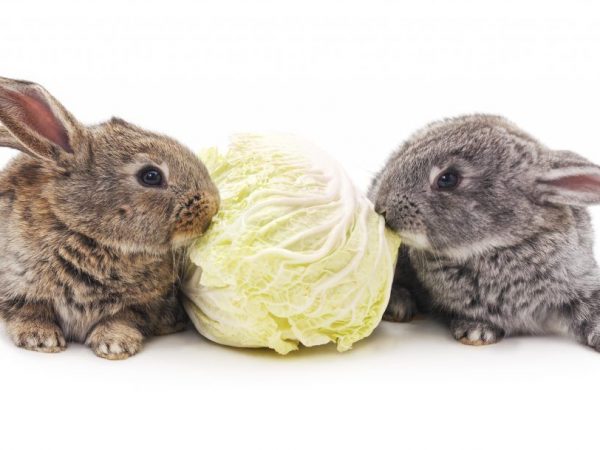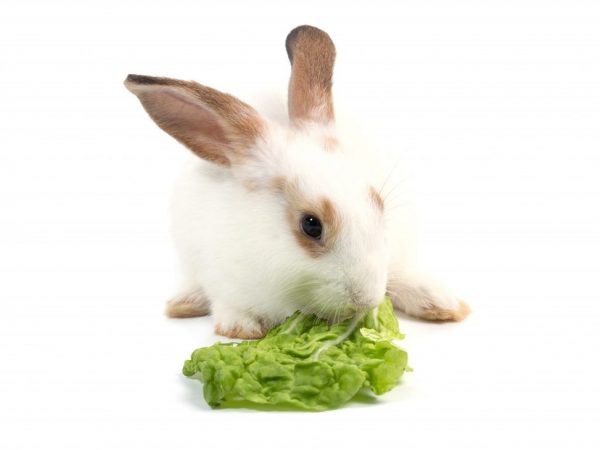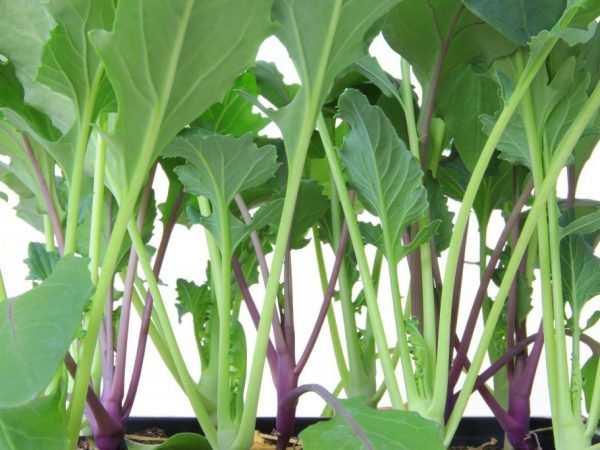Can rabbits add cabbage to their diet?
Rabbit breeding is a branch of animal husbandry that provides people with healthy dietary meat, as well as fur. Often, breeders who raise rabbits ask the question whether it is possible to give rabbits cabbage, whether they eat it.

Cabbage in the diet of rabbits
The key to the successful breeding of these animals is good nutrition, including nutritious food of plant origin. It is impossible to ensure proper feeding without white cabbage, because it contains many vitamins and minerals. This vegetable is especially rich in vitamin C, which is 10 times more in 100 g than in carrots. Rabbits love white vegetables, but sometimes they get bloated.
Benefit and harm
Is it possible for rabbits to have cabbage, is it beneficial or harmful? The answer is simple: you can, you just need to be very careful and know how much and in what quantity to give to the eared.
This vegetable belongs to the cultivated method of cultivation. Its benefits for the normal development of the animal are obvious. This healthy vegetable retains minerals and many vitamins for a long time, so the plant can be stored for the winter. These animals consume cabbage leaves with pleasure, as they are juicy and fill the body with moisture. The leaves also contain:
- B vitamins (B1, B2);
- vitamins C, PP;
- sulfur;
- potassium;
- phosphorus elements;
- calcium;
- folic acid;
- manganese;
- zinc.

The benefits and harms of cabbage
Cabbage can harm rabbits. A fresh head of cabbage promotes the work of the glands of the stomach, therefore it is not recommended to feed animals in large quantities with this vegetable due to the occurrence of problems:
- bloating;
- disorder of the digestive system;
- weakening of the body.
Most often, serious breeders have disputes about whether it is possible to give cabbage to decorative rabbits. The thing is that if the breed of farm eared eared is more consistent in terms of food, then the decorative fluffy requires a special approach in choosing the menu.
So veterinarians and breeders advise to introduce white cabbage into the diet of a decorative animal in stages, combining it with parts of the usual diet. You can start with one leaf a day, gradually increasing the dose.
How to determine the norm
Eared people eat this vegetable willingly. Can rabbits be given cabbage every day? It is possible, but in small quantities, otherwise the animals will stop eating other food, as a result of which the intestinal microflora will be disturbed and an active form of flatulence will develop. Rabbits need to be given slightly withered leaves, but stumps should be discarded, as they negatively affect the development of young animals and provoke diseases.
Rabbits are allowed to feed with cabbage according to the scheme per one individual:
- young individuals: in winter 100-200 g, in summer - 300 g;
- mature individuals: in winter 300-400 g, in summer - 500-600 g.
It is not uncommon for pets to have an upset stomach after eating the white cabbage variety. In this case, it is important to revise the main menu of the eagleIt may be necessary to balance such a vegetable by increasing the dry food.
Varieties of cabbage
You can give a vegetable of different varieties:
- white cabbage;
- Beijing;
- colored;
- kohlrabi.
The most succulent forage vegetable is kohlrabi, especially its leaves.
Such cabbage must be given to rabbits, since this species is distinguished by the content of a large amount of trace elements and vitamins. Fuzzies eat this type of vegetable well because it contains a lot of glucose and fiber. Can I feed white cabbage to rabbits? Yes, it is highly digestible and can be fed fresh or in silage form.

Varieties of cabbage for rabbits
Many livestock breeders often wonder if rabbits can eat Chinese cabbage. Veterinarians not only advise but insist on using this type of vegetable, because its leaves:
- have medicinal properties;
- significantly increase the functioning of the immune system;
- improve the functioning of the intestines and stomach;
- help in the fight against bowel cleansing;
- prevent digestive problems (constipation).
If possible, giving rabbits the Peking variety is recommended more often than others, so you need to think about growing it at home in the garden.
Eared eared cabbage and cauliflower are eaten both fresh and boiled. Cauliflower cabbage contains a substance called glucoraphanin, which is no longer found in any other vegetable. This trace element makes it possible to protect the mucous membrane of the rabbit's stomach from changes, and also helps prevent the development and reproduction of harmful bacteria that lead to various diseases.
In winter, it is recommended to feed the rabbits with sauerkraut, which is rich in vitamin C and a variety of minerals. Rabbits cope with sauerkraut no worse than with fresh leaves. It is necessary to feed in such an amount: 100-200 g per adult per day. It is also very important to consider the size of the rabbit.
Diet of decorative rabbits
Ornamental pets are also recommended to add Brussels sprouts to their diet. Moreover, during ripening, it should not be treated with fertilizers.
Ornamental rabbits do not need to be fed with the described vegetable very often, since it contains a lot of calcium, which leads to kidney disease. It is recommended to start adding cabbage leaves to the diet for decorative rabbits at the age of 3-4 months.
Additional recommendations
Diet recommendations for rabbits:
- You can not give rabbits stumps and leaves that are near it. Their use leads to indigestion and diarrhea.
- It is not recommended to add red cabbage varieties to the diet of rabbits, as animals may experience problems with the functioning of the gastrointestinal tract.
- Frozen heads of cabbage are the most dangerous for rabbits: they do not contain useful substances.
The rabbit is an animal that loves succulent food, as it is a source of minerals, vitamins and fiber. But it is always necessary to remember that when feeding rabbits with succulent plants, it is very important to adhere to the daily dosage, depending on the size and age of the animal.


